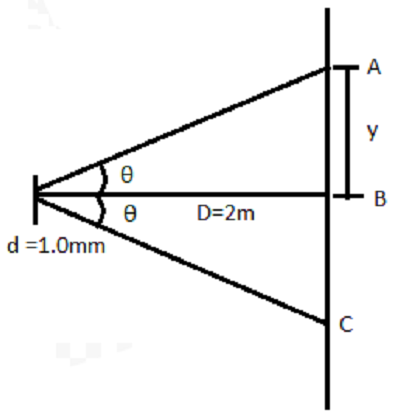Question
Question: A beam of light of wavelength 600 nm from a distant source falls on a single slit 1.0 mm wide and th...
A beam of light of wavelength 600 nm from a distant source falls on a single slit 1.0 mm wide and the resulting diffraction pattern is observed on a screen 2m away. What is the distance between the first dark fringes on either side of the central bright fringe?
A). 1.2cm
B). 1.2mm
C). 2.4cm
D). 2.4mm
Solution
Single slit formula gives the relation between the slit width, wavelength of the light beam, angle of refraction for different values of n. For smaller values of n, θ can be considered as zero. When n=1, the first dark fringe forms on either side of a central bright fringe. By substituting the values given, in the single slit formula, the distance can be found.
Formula used:
dsinθ=nλ
Complete step-by-step solution:

Let’s say, the first dark fringe formed at points A and C, and the central bright fringe at B. Here, the fringes formed on either side of the central fringe are symmetrical.
Hence, angle θ is the same for both fringes.
We have single slit diffraction formula,
dsinθ=nλ --------- 1
Where,
θ is the angle from the center of the wall to the dark fringe
n is a positive integer (n=1,2,3.....)
λ is the wavelength of light
d is the width of the slit
For small values of θ, sinθ≈θ
The, from figure
θ=Dy ------- (2)
D is the distance from slit to screen.
The distance between points A and B = The distance between B and C = y
Then, The distance between points A and C
= 2y
Substitute 2 in equation 1.
dDy=nλ
Then,
y=dnλD
Forn=1
y=dλD --------- (3)
Given,
λ=600×10−9m,
D=2m, d=1×10−3m
Substitute the value of λ,D and d in equation 3
y=1×10−3600×10−9×2=1.2mm
Therefore, Distance AC = 2y = 2×1.2 = 2.4mm
Hence, the answer is option D.
Note: For the fixed values of λ and n, as the d gets smaller, θ increases and vice versa. From the single slit formula, we can understand that the wave effects are most noticeable when the wave encountering object (here, slits a distance d apart) is small. Small values of d give large values of θ.
